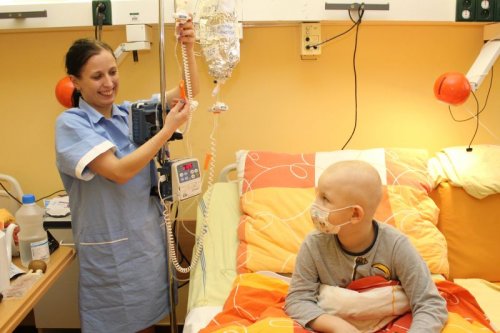What is waiting for us?
 Diagnosis
Diagnosis
- Diagnosis of cancer is an interdisciplinary process.
- It is based on a professional examination of a sample of suspicious tissue.
- When a cancer is suspected, a sample of the organ is usually taken by surgery during an operation called "biopsy".
- If leukemia is suspected, the patient undergoes an examination called "Bone marrow aspiration" ("sternal"), in which a bone marrow sample is obtained from the sternum or hip bone, in infants from the tibia.
- The sample is followed by a detailed examination to determine the exact diagnosis.
Initial examination
- All patients need to be examined for initial health, which may change over the months as a result of diagnosis and oncological treatment (eg neurological examination, eye examination, kidney examination, cardiac function examination,…)
- In addition, in the diagnosis of cancer, we are looking for its possible spread in the body by a number of imaging methods and examination techniques.
Initiation of treatment
- Based on the summary information about the disease, we are launching standard anticancer treatment in accordance with European therapeutic schemes for specific diagnoses.
- The treatment of childhood cancer is a complex process involving a number of doctors and health professionals in various fields.
- The duration of treatment depends on the specific diagnosis and course of treatment, which is usually accompanied by a number of expected complications.
- The first months of treatment usually take place in a hospital and home visits are only occasional and short. At the end of the intensive treatment phase, outpatient care and long-term follow-up continue.
Academic (treatment optimizing) clinical trials
- Academic treatment-optimizing clinical trials are a separate treatment chapter. Tumor therapy is conducted according to precise international recommendations. The principle of the studies is to test the optimal method of treatment using known, already used pharmaceuticals. Patients with the same diagnosis are usually treated in two or more ways, with different treatments usually consisting of enhancing or reducing therapy, different dosages or sequences of drugs administered, and the like. Such treatment includes informed consent to so-called randomization.
Randomization
- Randomization (from the English word "random", means "chance") is a procedure in which the patient is randomly selected for a particular treatment. The division of patients into individual treatment procedures, or so-called treatment branches, is generated by a computer. Randomized clinical trials are the basis for advances in tumor therapy - treatment outcomes as well as side effects of new drugs will be clarified by the results of data analysis after such a study. Inclusion in the study may not always lead to improvement in the child forecasts compared to standard treatment. However, a randomized trial is always beneficial in the cancer treatment of future patients, as its results help to optimize anticancer treatment.

